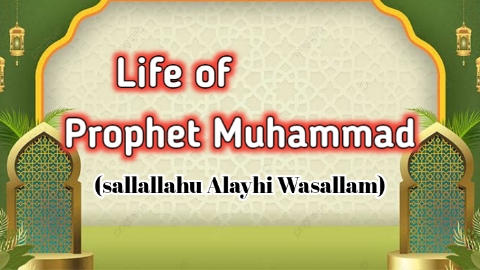
Among the countless figures in human history, Prophet Muhammad (Sallallahu Alayhi Wasallam) stands unmatched—not merely as a religious leader, but as the ultimate example of moral excellence, humility, and divine guidance. For Muslims, knowing who is Prophet Muhammad (Sallallahu Alayhi Wasallam) is not just academic—it’s a matter of love, identity, and faith.
Allah honored him in the Qur’an as:
“And indeed, you are of a great moral character.”
(Surah Al-Qalam, 68:4)
This article offers an authentic and heartfelt journey through the life of Prophet Muhammad (Sallallahu Alayhi Wasallam), his mission, character, and lasting legacy. Let us explore why he is remembered as the greatest man in history.
His Noble Beginnings in Makkah
Birth and Early Life
Prophet Muhammad ﷺ entered the world in 570 CE in Makkah, born into the respected Banu Hashim family of the Quraysh tribe. With his father passing away before he was born and his mother dying when he was only six, he faced the trials of orphanhood early. He was then raised by his grandfather, Abdul Muttalib, and later by his uncle, Abu Talib, who cared for him with great affection.
“Even in his youth, his honesty stood out, and he became known as Al-Ameen and As-Sadiq—titles that reflected the character which would later define his message to the world.”
Receiving the Divine Message
The Call to Prophethood
At age 40, during one of his retreats in the Cave of Hira, Angel Jibreel (Gabriel) descended with the first revelation:
“Read in the name of your Lord who created.”
(Surah Al-‘Alaq, 96:1)
This marked the beginning of a mission that would transform the world. From this moment forward, who was Muhammad (Sallallahu Alayhi Wasallam) evolved—he was no longer only the honest man of Makkah but the last messenger of Allah, chosen to deliver Islam.
The Struggle in Makkah
Years of Patience and Propagation
In Makkah, the Prophet ﷺ faced immense hostility. The Quraysh mocked and persecuted him and his followers. But his response was one of patience, compassion, and constant Du’a (supplication). Despite hardship, he never compromised on truth.
Even when offered wealth or leadership to abandon his mission, he said:
““Even if they gave me control over the sun and moon, one in each hand, I would not forsake this mission—by Allah.”
Migration and Building the Muslim Community
Hijrah to Madinah
After years of persecution, the Prophet ﷺ was granted permission by Allah to migrate to Madinah. This Hijrah was more than a physical move—it was the beginning of a new era. In Madinah, he built a peaceful, diverse society based on faith, justice, and mutual respect.
He united tribes, protected minorities, and led by the Qur’an. His leadership was marked by fairness, humility, and vision.
Family Life and His Daughters
The daughters of Prophet Muhammad (ﷺ) played a vital role in his life. Among them, Hazrat Fatimah (RA) was especially close to him.
His deep affection for her is recorded in many Hadiths. He said:
“Fatimah is part of me. Whoever harms her has harmed me.”
(Sahih Muslim)
Despite personal losses, including the death of his beloved wife Hazrat Khadijah (RA) and multiple children, the Prophet ﷺ remained resilient and deeply faithful to Allah.
His Moral Example: Mercy in Action
The Conquest of Makkah
Despite returning to Makkah at the head of a 10,000-strong army after enduring years of exile and hostility, the Prophet ﷺ showed no desire for revenge—instead, he granted forgiveness to those who had once tormented him.
“No blame will there be upon you today. Go, for you are free.”
This act of forgiveness cemented his legacy as Prophet Muhammad (Sallallahu Alayhi Wasallam) – the greatest man in history, a man of mercy even in victory.
Legacy in Scriptures and Beyond
Prophet Muhammad (Sallallahu Alayhi Wasallam) in the Bible
Muslim scholars have long pointed to references in Christian and Jewish scriptures that align with the arrival of a final prophet. The Qur’an confirms:
“Those who follow the Messenger, the unlettered prophet whom they find written in the Torah and the Gospel…”
(Surah Al-A‘raf, 7:157)
Though debated, the idea of Prophet Muhammad (Sallallahu Alayhi Wasallam)in the Bible reflects his role as the continuation of divine guidance after the prophets of Bani Israel.
The Final Sermon
During his last Hajj, Prophet Muhammad ﷺ delivered a sermon that summarized the foundation of Islamic ethics: human equality, rights of women, sanctity of life, and adherence to the Qur’an and Sunnah.
He proclaimed:
“What I leave behind are the Qur’an and my Sunnah—if you remain steadfast in following them, you will never lose your way.”
Prophet Muhammad’s Everlasting Impact
The full story of Prophet Muhammad (Sallallahu Alayhi Wasallam) is not just a historical narrative; it’s a blueprint for living. His teachings influence over a billion lives today—spanning every continent, race, and language.
Whether you reflect on the prophet muhammad (Sallallahu Alayhi Wasallam) full story, his profound hadiths, or how he revolutionized society—one truth stands clear: he brought light where there was darkness.
From his honesty as a merchant to his bravery in battle, from his deep love for his family to his spiritual devotion in prayer—every moment of his life teaches us how to live with purpose.
Conclusion: Following the Light of the Final Messenger
Who is Prophet Muhammad (Sallallahu Alayhi Wasallam)? He is the seal of the prophets, the beloved of Allah, the most merciful to mankind, and the greatest man in history. His character, compassion, and message remain a timeless guide for those seeking truth and peace.
Let us learn from his life, love him deeply, and strive to emulate his Sunnah in every aspect of our own.
“Indeed, in the Messenger of Allah you have a beautiful example for those who hope in Allah and the Last Day and remember Allah often.”
(Surah Al-Ahzab, 33:21)
May Allah send His peace and blessings upon Prophet Muhammad (Sallallahu Alayhi Wasallam), his family, and his companions. Ameen.
